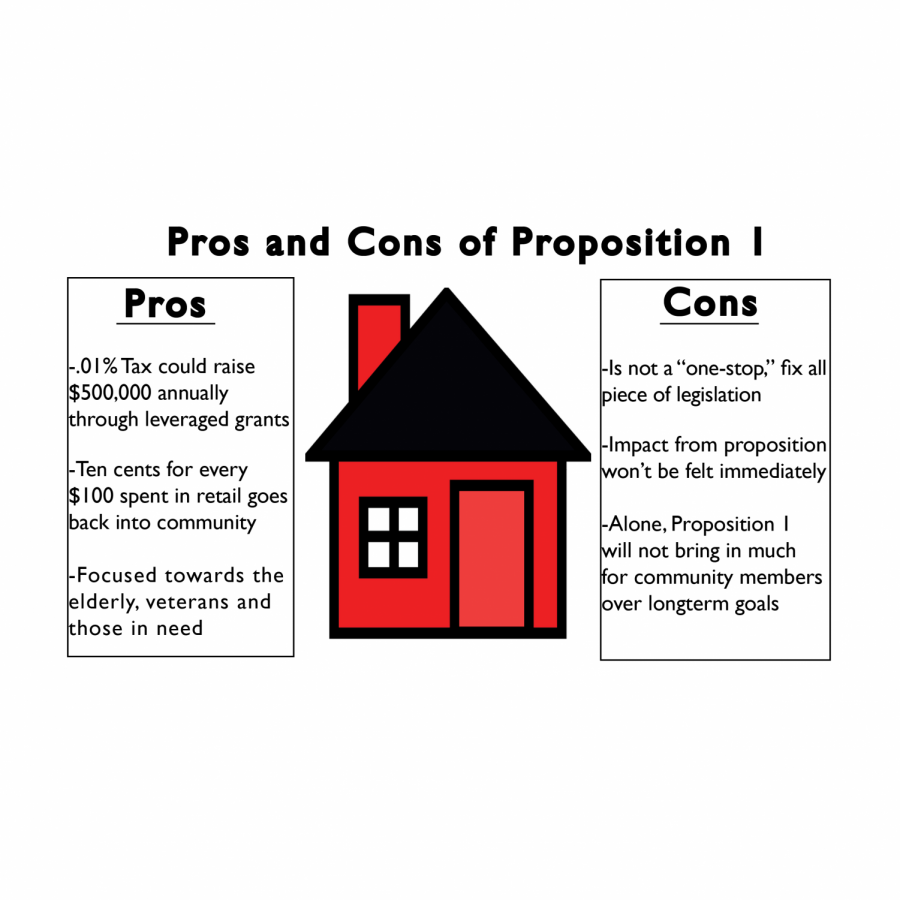Ellensburg to vote on affordable housing
Could Proposition 1 be the ticket that leads the small town of 25,000 to a brighter, more affordable future?
November 2, 2017
In a town with a population of less than 25,000 people, and a student body making up nearly half that number, the need for affordable housing is crucial.
Alejandro Reyez-Gonzalez, senior at CWU, said it’s hard for him to afford living on his own because of the price, which is why he has to have a roommate. He said the cost of rent and internet along with electricity all add up to a price that causes many people to barely scrape by.
“At one-point last year it was either pay electricity or buy food,” Reyez-Gonzalez said. He had to pay the bill and wait till he had his next paycheck to buy more groceries.
Because of students like Reyez-Gonzalez and other low-income community members, voters this Tuesday will decide whether to add a 0.1 percent retail sales tax to be spent on affordable housing.
This means that for every $100 spent in a retail store, such as the Wildcat Shop, an extra 10 cents in tax will be added.
The sales tax would go toward the development of housing and related issues, primarily aimed at supporting low-income families below the 60 percent area median income – which must be less than $40,320 annually.
The movement to put Proposition 1 on the ballot was spurred by the crisis at the Shady Acres mobile home park. When the Kittitas County Commissioners bought the land to expand the fairgrounds, it became clear that the residents would have a difficult time finding an affordable place to move.
“Seeing the families and those who were affected, [made it] easier to have conversations with people and think about the way we perceive affordable house,” Angela San Filippo, long range planner for Ellensburg’s Community Development.
Many have speculated the tax could raise $500,000 annually, but some residents believe that it may not be enough to make a difference.
“They’re not going to get enough revenue to do any good; it’s a step in the doorway to raise taxes on the people. They’d need to charge us another full one percent to make a real difference,” said Ron Larson, a retired member of the Ellensburg community who is voting against Proposition.
Although he’s retired, Larson oversees a housing complex in the community and his tenants are primarily low-income families that the sales tax is aimed at supporting.
“I know there are people that are hurting and need help out there, but some are lazy and people need to be responsible for their housing and their living. I’ve talked to them before, if they’re not going to work, then I’m not going to feel sorry for them,” Larson said.
However, the city argues that the tax revenue could lead to something greater.
“The raw amount of it isn’t going to do a lot. Their argument is that they can leverage it for bonds and it could grow to be a few million dollars annually,” Todd Schaefer, a political science professor at CWU, said.
Should development companies or bondsman be interested in housing development, Schaefer believes that the the sales tax revenue could have a multiplier effect in the upcoming years.
“Will it solve the problem quickly? No it won’t. [But] it will certainly help and it’s got to be better than what we have now,” Schaefer said.
Proposition 1 focuses on students, seniors, veterans, the disabled, the homeless and low-income families in danger of becoming homeless.
According to the Housing Needs Assessment completed in March by the city, over half of Ellensburg residents spend a third of their income on housing needs alone, and a third of residents spend over half of their total income.
“Ultimately what we’re hoping to do is amass money to spend on construction. The demand for apartments outstrips the supply,” Bruce Tabb, a member of city council, said.
The housing assessment states that studios and three bedroom apartments are at zero percent availability, and other housing alternatives are sitting at 1 percent availability, where a healthy market typically sits between four and five percent.
Kittitas County is one of the top 10 fastest growing counties in the United States. As of 2016, 21,340 people lived in Ellensburg and it’s urban growth area. Between 2000 and 2016 the area grew by 1.6 percent annually.
“What we’re attempting to do is create a community that’s more balanced. If we can [increase] capacity it reduces the pressure for the whole community, and that’s including students,” Tabb said.
With record increases of student enrollment at CWU, more upperclassmen are seeking out housing alternatives off-campus, increasing the demand for affordable housing when the supply can’t keep up.
Because of this high demand it’s nearly impossible to find apartments that do not demand a year-long lease, despite many students only living in Ellensburg for the school year, according to Reyez-Gonzalez. He continued that both apartments and on-campus housing is too expensive without roommates or an extensive discount.
“The challenge of that is simply capacity, there is simply not enough places to go. At any level Proposition 1 is not the solution but it’s a part of it. My idea is that we use that money to jumpstart projects to create new housing,” Tabb said.
The housing assessment lists Kittitas County as the second most cost-burdened county in Washington state, meaning that the family is spending greater than 30 percent of their income. Roughly 185 families on waitlist for housing in the county and about 65 families in need within Ellensburg.
“By increasing vacancy rates, prices will be more competitive, with more choices to choose from,” Tabb said.
Ballots were distributed to registered voters in the middle of October, and voting results are planned to be posted with the Nov. 7 election.


